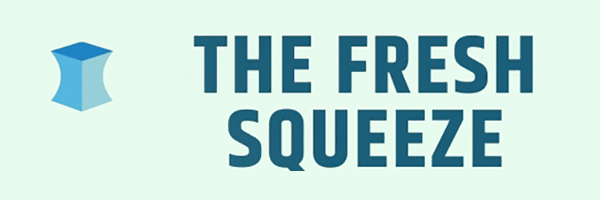|
|
|
|
Weds Edition | Mar 16, 2022
|
|
|
|
|
|
|
|
|
|
|
|
|
If you’re lucky, daylight savings came and went on Sunday without much thought, refreshing you with brighter days late into the evening. If you’re me, the lost hour of sleep has created a jet lag-esque effect that for the better part of this past week, shattering all hopes of productivity and alertness, as the frustration around why we use this archaic method, designed to help colonial farmers harvest crops, builds inside. So whether you’re getting a lot or not much at all, let’s talk about sleep…
|
 |
Gif from Tenor
|
Session Plan:
|
|
The Warm-Up – All the health benefits of your morning cup of coffee (or 2, or 3…)
Heavy Sets – Can you pass this single leg squat test?
Water Break – The top podcasts to put you to sleep
Finisher – Understanding how a good night’s sleep changes as we age
Cool Down – What’s the “future of fitness” according to industry experts?
|
|
Happy Wednesday!
— TFS
|
|
|
|
|
|
|
|
|
|
 |
Photo by American shot 8.0 from Pexels
|
|
Nutrition Section
|
|
Some think of caffeine as the enemy of sleep, but most can’t imagine a day without a morning coffee. And the coffee industry couldn’t have grown to an over $100b industry on sleepless nights alone… surely there must be some health benefits to a morning cup of Joe.
Research has shown a link in coffee consumption and the reduced risk of heart disease, Parkinson’s disease, colon cancer, and Alzheimer’s disease. Coffee has been shown to reduce the risk of Type 2 diabetes by improving the body’s ability to process glucose (sugar), and you might be more likely to have liver enzyme levels within a healthy range than people who shun the drink.
So tip back your mugs, take that shot of espresso, and enjoy the 20 minute wait at Starbucks – you’re getting healthier for it!
#NutritionTips
|
|
|
|
|
|
|
|
 |
Photo from outsideonline
|
|
Movement Section
|
|
Taking a single leg squat test is a great way for athletes and general population people alike to assess dynamic hip control, lower balance strength, balance, and mobility, and unilateral (one side, or in this case, leg, at a time) movement patterning.
By sitting back into a chair, bench, or elevated surface behind us, and then standing up on that same single leg, we can identify imbalances on a leg to leg basis that can be, with a certain degree of scientific certainty, the main predictors of lower body injuries. Think ACL tears, hip injuries, rolled ankles, and much more. The ability to maintain the knee in line with the hips and foot while taking such a test is not only a cool-looking exercise, but also can serve as a confirmation of lower body health long into our lives. So pull up a chair or sit back onto your couch (start with a higher seat than you think you might need and work your way down if you feel good about things) and take the single-leg squat test.
#WorkoutIdeas
|
|
|
|
|
|
|
|
 |
Gif from Gifer
|
|
Weekly Recommendations
|
|
Because there’s a podcast for everything, here’s 8 for helping you get to sleep at night.
The list is a combination of sleep meditations, ASMR and comforting sounds, and story-telling designed to lock you into a long and peaceful slumber. My personal favorite over the past few years (and #1 on the list) – Drew Ackerman’s Sleep with Me.
#TFSRecommendations
|
|
|
|
|
|
|
|
 |
Photo by SHVETS production from Pexels
|
|
Senior Section
|
|
The best part of growing up? No more bedtime. The worst part of growing up? Falling asleep at 8pm even though you have no more bedtime.
Sleep demands change quite a bit as we age. The hypothalamus controls the “clocks” in our brains, and are made up of the suprachiasmatic nucleus (SCN). As we get older, the SCN deteriorates, making it more difficult to regulate sleep, find consistent sleep, and enjoy the same ebbs and flows of energy as we did at younger ages.
The body’s sleep schedule shifts forward – leading to tiredness earlier in the evening, but higher levels of alertness earlier in the morning. However, it is completely a farce, a myth, a made-up piece of nonsense, that older adults require any less sleep than younger adults. As a matter of fact, a majority of conditions that affect older demographics can be avoided, or at the very least, fought, by maintaining seven to eight hours of sleep each night.
The Sleep Foundation takes a deeper dive into the importance of sleep as we age – including how aging affects sleep, some common issues that may pop up because of this, and how we can best combat these issues as we grow older.
#SeniorSection
|
|
|
|
|
|
|
|
 |
Photo from cnet
|
|
Quick Hitters and Weekly Wrap-Up
|
|
Save 50% as an Amazon Prime Member on Halo, their fitness and sleep tracking band.
The Future of Fitness… is in the metaverse? See where industry leaders think that fitness is heading from the 2022 Connected Health and Fitness Summit.
Enjoyed The Fresh Squeeze? Subscribe to our weekly health, fitness, and nutrition newsletter, sent straight to your inbox… See you next week!
Have questions about your own fitness routine you’d like us to address? Or feedback about what you’d like to see more or less of? Shoot us an email – [email protected], we’d love to hear from you!
#GetSmarter
|
|
|
|
|
|
|
|
|
|
Until Next week,
|
|
Mickey at TheFreshSqueeze
|
|
Presented and Edited By: Mickey Adams & Lizzie DeVito
|
|
|
|
|
Enjoyed The Fresh Squeeze? Subscribe to our weekly health, fitness, and nutrition newsletter, sent straight to your inbox… See you next week!
|
|
|
|
|








I simply could not go away your web site prior to suggesting that I really enjoyed the standard info a person supply on your guests Is going to be back incessantly to investigate crosscheck new posts